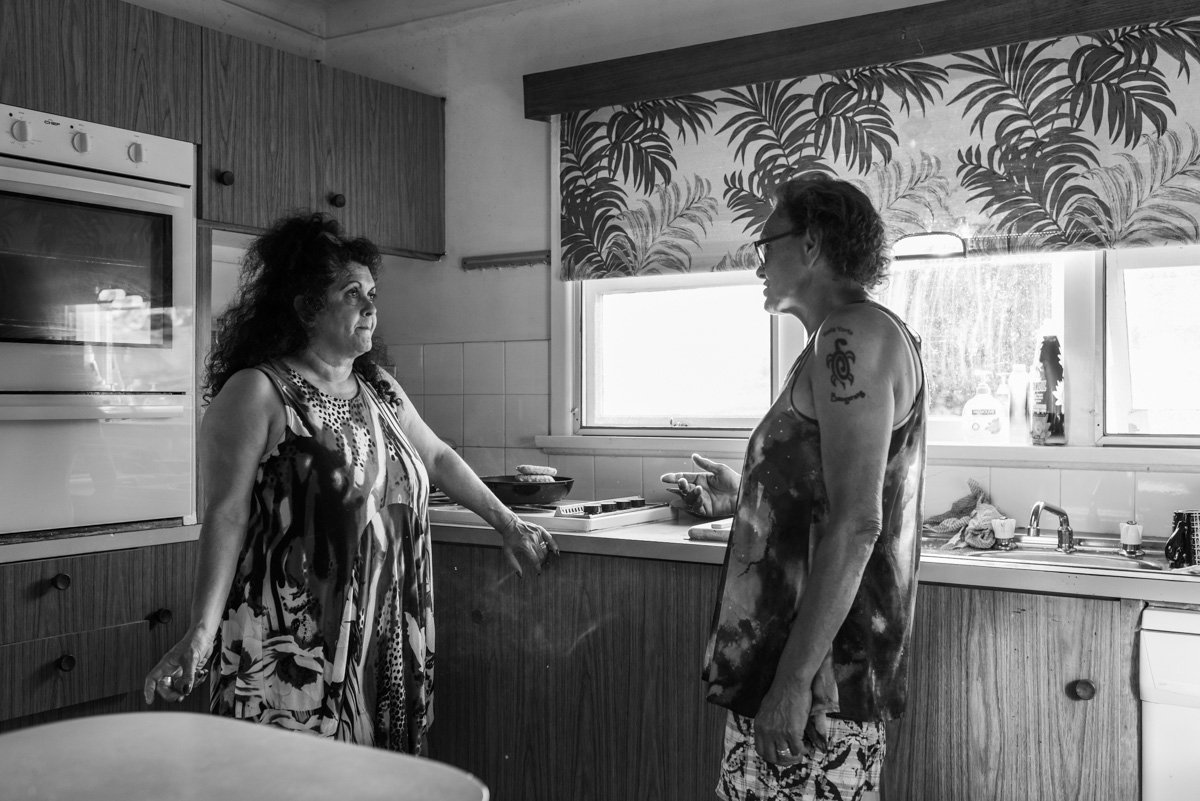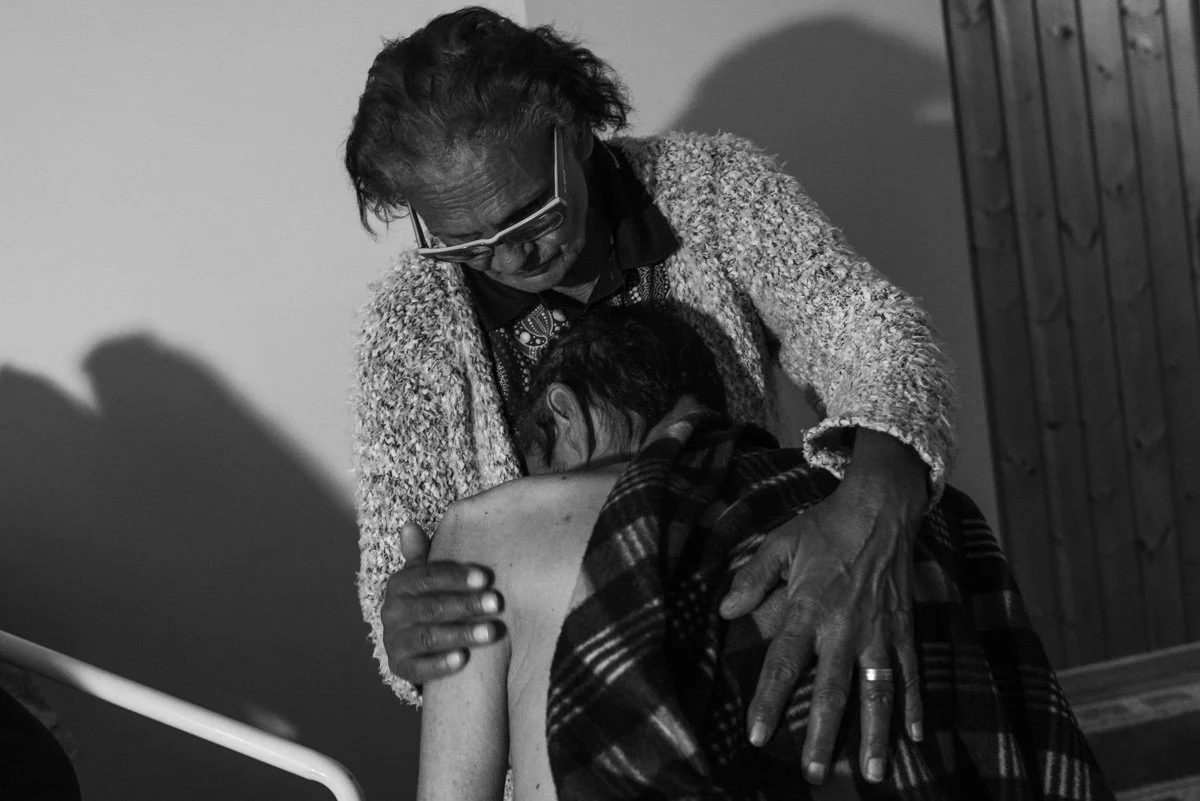
The Long Goodbye
2019
Yuin Country / Central Tilba, NSW
A Stolen Generations Story
WARNING
Aboriginal and Torres Strait Islander readers should know this story contains images of people who have made their journey to the Dreamtime.
The Long Goodbye
2019
Yuin Country / Central Tilba, NSW
A Stolen Generations Story
Wolithica Man (Yorta Yorta Nation) Glen Atkinson. 14 January 2019. Yuin Country / Central Tilba, NSW.
After a series of significant health issues, Wolithica Man (Yorta Yorta Nation) Glen Atkinson was sent to Canberra Hospital in December 2018. Testing led to a terminal liver cancer diagnosis and Glen was given “days to a week” to live. Rather than going into palliative care in a hospital or a hospice, he chose to go home to Tilba, on Yuin Country, to just take each day as it came and “let it all unfold”.
From the moment he fell ill, his wife, Western Arrernte Woman Merryn Apma-Atkinson, took up the mantle of care for Glen. Glen’s older sister, Yorta Yorta Woman Karen Atkinson, came to care for them both; she had been Glen’s guardian spirit throughout his life, always there for him whenever he needed her. They had a lot of work ahead of them but, as Karen said, “If you want to get something done, get a couple of black women to do it.”
Back in Tilba, Glen was flooded with love and support from hundreds of family, friends and community members. They all came to say goodbye in many ways over many months and in a few different places. They were there when he came home from hospital, at his living wake, after he passed, for his funeral, when his headstone was unveiled and all the way along.
Just how long it took to say goodbye speaks to Glen’s measure and lies at the heart of this story about the last few months of his life. It also follows the poignant confluence and culmination of two significant arcs in Glen’s life, one tragic, the other exultant, the former because he is one of the Stolen Generations, the latter despite it.
The Book
September, 2019
229 pages / 209 photographs / Foreword by Warlpiri Woman Rachael Hocking / Essay by Michael Weinhardt / Artwork by Western Arrernte Woman Merryn Apma / Digital / Landscape / A4 (30cm x 21cm) / ISBN 9780646808796 / Published in September, 2019
Glen’s story is through a book, called “The Long Goodbye”. The entire project was done pro-bono and, consequently, the book is available as a free download.
Excerpt
“Back in Tilba, Glen, Merryn and Karen were flooded by support from family, friends and community.
Glen was known as a gentle, cheeky and caring bloke. He was a listener, an observer and an astute judge of character. He had a deep spirituality that he shared with those who needed it. He spoke economically but his words paid dividends. With warmth and humour, and a gift for storytelling, there was a touch of the Irish about his nature. Behind the twinkle in his eyes, some saw the sadness.
He was a good man who did right by many. If one person had bad words for Glen, a hundred had good. He was fallible, as people are, but took responsibility for what he could. Though, his passing left him short on time to see repaired the few remaining loose threads of his life.
When Glen said, “I’ll see ya when I’m lookin’ at ya,” it meant a lot more than a throwaway line.
Hundreds came to say goodbye in many ways over many months. They were there when he came home, at his living wake, after he passed, for his funeral, when his headstone was unveiled and all the way along.”
Donate
The Long Walk
This story was done pro-bono and this version of the book is not for sale. However, if you read the book, please consider making a donation to The Long Walk, a charity started by Michael Long (AFL Great for Essendon Football Club, Indigenous Leader) to achieve equality between Indigenous and Non-Indigenous people.
“Bringing them Home was the name given to the final report of the National Inquiry into the Separation of Aboriginal and Torres Strait Islander Children from Their Families conducted by the Human Rights and Equal Opportunity Commission (now called the Australian Human Rights Commission).
The National Inquiry into the Separation of Aboriginal and Torres Strait Islander Children from Their Families was established by the Attorney General in 1995. Over two years, the National Inquiry took oral and written testimony from over five hundred Aboriginal and Torres Strait Islander people across Australia, as well as from Indigenous organisations, foster parents, State and Territory Government representatives, church representatives, other non-government agencies, former mission and government employees and individual members of the community. The 689 page final report, tabled in Parliament on 26 May 1997, includes many of these personal testimonies as well as 54 recommendations to support healing and reconciliation for the Stolen Generations, their families and the Australian public more broadly.”
From Bringing Them Home (Australian Human Rights Commission).
Redress
State by State
As at May 2019
During production of this story, Glen received compensation under the National Redress Scheme (Victoria), which is for victims of sexual abuse received while in State care; he was the first Victorian to do so. At present, Victoria does not have a redress scheme specifically for the Stolen Generations.
The Federal Minister for Indigenous Australians, The Hon Ken Wyatt AM MP (Federal Member of Hasluck), was contacted for information regarding the Federal Government’s position on the Stolen Generations and support options for them at both Federal and State Government levels (as of May, 2019). This is his response (verbatim):
“The Commonwealth Government continues to recognise the grief, suffering and loss suffered by the Stolen Generations and their families, which sadly continues today for many Aboriginal and Torres Strait Islander peoples.
Each year, around $50 million is committed under the Indigenous Advancement Strategy (IAS) for practical actions that help support members of the Stolen Generations and their families, including through the Healing Foundation.
In 2018/19, $54 million has been allocated to more than 110 organisations to provide a range social and emotional wellbeing services including to support Stolen Generations and their families that strengthen connections to family and community, address grief and trauma and build the resilience and capacity of individuals to respond to life stressors.
Further information on available support:
While reparations for the Stolen Generation are primarily a state responsibility, the Australian Government provides a range of support to the Stolen Generations and their families to support healing and wellbeing, family tracing and reunifications.
Approximately $12 million was allocated to Link Up services during 2018/19. Services include family tracing, reunions, group therapeutic and healing activities, gatherings, commemorative events, and education programs. Link-Up services are funded specifically for members of the Stolen Generations and their families.
Approximately $11 million was allocated to a range of national projects during 2018/19. They include the Australian Institute of Aboriginal and Torres Strait Islander Studies – Family History Unit, the Aboriginal and Torres Strait Islander Healing Foundation, the National Indigenous Critical Response Service and Mental Health First Aid.
In 2017, $0.5 million was allocated to the Healing Foundation through the IAS Safety & Wellbeing Programme to conduct the detailed needs and demography analysis recommended as ‘priority one’ in its report. THIS REPORT is available on the Healing Foundation website. The Foundation was also funded to develop options to improve access and preservation of family history records ($0.5m) and resources to support Stolen Generations in aged care ($0.4m) – this work is continuing.
Another report of interest is the AIHW Report – Children living in households with members of the Stolen Generations, which will be published on 11 June 2019. This new report analyses specific aspects of the intergenerational connection between children and Stolen Generations members living in the same household, and provides evidence of the ongoing inter-generational impact of forcible family removals in the past.
Approximately $26 million was invested in the ongoing provision of counselling and social and emotional wellbeing support. These services are provided by approximately 90 Indigenous Community Controlled Services located across the nation. These services prioritise members of the Stolen Generations and their families, as well as being accessible to all Indigenous Australians.
Workforce development formed part of the broader Social and Emotional Wellbeing Program package to support members of the Stolen Generations. In 2018/19 approximately $5.4 million was allocated to support the workforce who provide Social and Emotional Wellbeing and alcohol and other drugs counselling and Link Up services. Activities include the provision of accredited and non-accredited training and professional development, debriefing, peer support and access to supervision.
In 2017, NSW established a Stolen Generations Reparations Scheme (with payments of up to $75,000) to support Stolen Generations organisations and created a new fund to support healing activities. This scheme is currently open.
South Australia announced an $11 million Stolen Generations Reparations scheme in March 2016.
Tasmania established a $5 million monetary compensation scheme in 2007.
Queensland and Western Australia have both offered broader support packages to children in institutional state care, including the Stolen Generations.
Victoria currently does not have redress scheme, noting that a Victorian treaty process is in very early stages and the issue of redress has not yet been considered.
Publicly available data about the number of Redress applications received nationally can be found Here (see below) on the National Redress Scheme website. As at 24 May 2019:
The Scheme received over 3,900 applications.
187 Redress payments have been made.
In addition, a further 35 offers have been made. Applicants have six months to consider their offer.
The average Redress payment amount is around $82,000.”
Genocide
United Nations
Convention on the Prevention and Punishment of the Crime of Genocide
Article II
In the present Convention, genocide means any of the following acts committed with intent to destroy, in whole or in part, a national, ethnical, racial or religious group, as such:
A. Killing members of the group;
B. Causing serious bodily or mental harm to members of the group;
C. Deliberately inflicting on the group conditions of life calculated to bring about its physical destruction in whole or in part;
D. Imposing measures intended to prevent births within the group;
E. Forcibly transferring children of the group to another group.
The Convention on the Prevention and Punishment of the Crime of Genocide was ratified by Australia on 8 July 1949 and came into effect on 12 January 1951.




















